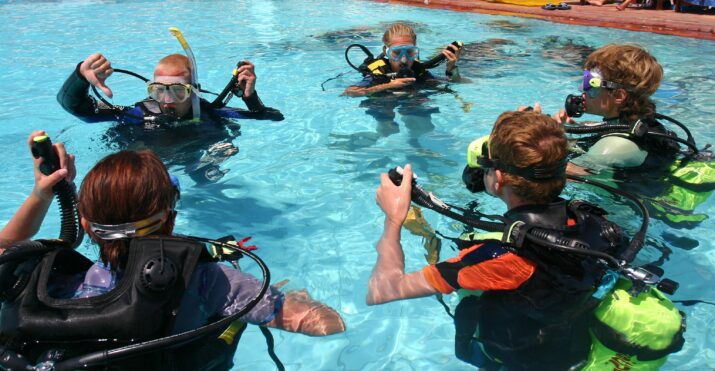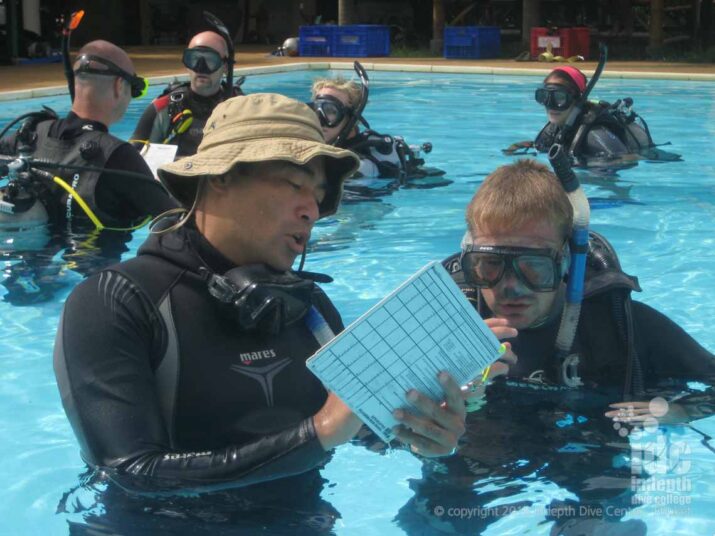If you have decided to start your underwater adventures, then congrats!
You are about to explore an amazing world, and every dive will be unique. Yet, your safety is the number one priority, so choose wisely your Scuba school and Instructor.
Our first experiences affect our perspective, excitement, enthusiasm, and comfort.
That said, a drunken driver on my best friend’s second day of driving school wasn’t enough to scare her off her wheel.
Or, an irresponsible MMA trainer wasn’t enough to bully my brother off the ring. Even though back then, my brother was still a teenager.
Here are your 4 non-negotiables when you are searching for your Scuba school and Instructor.
⓵ Do Your Homework – Prepare Yourself
Before you pay or sign anything, do some research first.
Even before approaching the Scuba Centre, take a look on the internet.
It wouldn’t take much time, and it will save you time and money on the process.
Does the school have a website? Is there any FAQ or valuable info you can learn more about the school? Does their website, Facebook, or Instagram page look like they are pros?
Although not necessary, these are good signs that they take their job seriously.
Are there enough reviews for the Scuba Centre on relevant forums or websites? Is there something fishy about the reviews?
For example, let’s say that the school is in a tourist area. If the reviews are either 5 stars or 1 star, something doesn’t make sense. Especially if the top reviews have no comments. Or, the reviewers’ profiles look somewhat shady.
After you do your initial research, pay a visit to the Scuba school. It is more than fine to ask questions.
Scuba is an amazing recreation activity, but you might injure yourself permanently if you are not properly trained.
Do not hesitate to ask as many questions as you need.
Here are some questions that may come in handy:
- Who will be my Instructor?
- How many instructors will I have? Some schools will assign you a different instructor every time. As every Instructor might have their own teaching style, this might be overwhelming for some.
- How long have you been teaching?
- How many divers have you certified?
- What Scuba organization are you affiliated with and why?
- What’s included in the price?
- What’s the process?
- How big will be our dive group?
- What are the minimum fitness levels? What’s expected from me in general?
- How long will it take? What type of Scuba exploring I’ll be able to do afterward?
- Are there any scenarios that we will need more time/money/lessons? What are these scenarios?
- What are your available types of first-aid and medical equipment?
When you ask your questions, listen as carefully as you can. Something doesn’t add up if your Instructor is not responding to your questions in a clear or direct way.
Think of it that way.
if they have trained many divers, they have answered similar questions many times.
Also, if you notice that your questions irritate them and they lose their temper easily, it is better to walk away. Learning in and out of the water from someone with zero patience is not optimal for most people.
⓶ Their Equipment’s Condition
 Photo: deeperblue.com
Photo: deeperblue.com
Scuba’s equipment is expensive.
So it makes sense not to invest money before you begin, as you might not like it after all.
However, for hygiene reasons, it’d be better to bring your own mask and fins.
Especially for the diving mask, here is a quick question for you.
How would you feel if you borrowed a scuba mask stored in a filthy warehouse and because you forgot to bring the anti-fog, your Instructor told you:
“Oh, just spit on it. Just like everyone else does, no problem.”?
I guess you wouldn’t like it. I didn’t.
Apart from the mask and fins, you will probably use their equipment (suit, Scuba instruments, regulator, cylinder, etc.).
That’s fine, as long as they maintain their equipment regularly.
Before using one, the school must instruct you first on Scuba equipment 101. Pay close attention to this lesson.
If you think that something doesn’t work right, ask for another one. Again, ask as many questions as needed, and pay close attention.
Always keep that analogy in mind.
If a complete stranger asked you to dive into the bottom of the ocean with no expertise and broken equipment, you would refuse.
If equipment looks unsafe, don’t use it.
When you feel ready to get your first dive computer, here is John’s rockstar guide
⓷ What Is Your Goal?
That was the first question my Instructor asked me, and for me, it was the key indicator that he was a pro.
Meditate on your Scuba goals. The first levels of training will be the same no matter what your big goal is.
But, keep in mind that there are several paths to choose from in Scuba.
Your upper-level training will be a lot different if:
You want to become a Scuba Instructor in the long run
You are interested in ice-cold explorations
or
You are interested in tropical underwater caves exploring.
Your decisions impact your top skills and equipment.
As you collect more dives under your belt, your main goal will start to become more clear.
Keep diving.
Setting a goal in Scuba follows no different pattern than the ones you do for your life or business. It usually looks like this:
- Think about the golden results you want to reach
- Create SMART goals
- Create an action plan with timelines
- Take action
- Evaluate your progress and adjust accordingly
You can check here more about the useful tips on setting goals.
⓸ Confirm your Educated Choice
 Photo: idckohtao.com
Photo: idckohtao.com
You did your research before and after reaching out to the Scuba School. You interviewed your Instructor, and your gut told you that they look fine.
You started the theoretical induction, and their equipment looks well maintained.
Now is the time to confirm that both your instincts and educated decision are right. If you made a bad call, no worries. Don’t stick to it just because it resonated with you first.
Most Scuba Schools require a 50% payment upfront, so you will lose half your money in the worst-case scenario because you didn’t make a fine choice.
It could be worse, like injuring yourself or suffering from the Dunning–Kruger effect. That “illusion” effect could lead to disastrous situations in your future Scuba adventures.
Keep in mind that there is an enormous drop-out rate in Scuba after the first level’s completion.
One main reason for this is inadequate teaching and unprofessionalism, leading to traumatic experiences for the Scuba rookies. They miss a lifetime of adventure because of their poor choice of Scuba School or Instructor.
Indicators that confirm you are in good hands:
 Photo: idcphuket.com
Photo: idcphuket.com
① Notice how your Instructor flows underwater. Struggling with their buoyancy is not a good sign.
② When they demonstrate a skill, does it look good to you? Do you feel like they can deliver that skill effectively to you if they can’t do it themselves?
③ Does their character, mentality, dedication, and abilities resonate with you? You are not looking for a new buddy or romance, but how can they train you in full effect if they fail to inspire you?
④ You perceive the process as organized, structured, and smooth. There are only as many trainees as your Instructor can handle.
⑤ The Centre doesn’t rush things. If they want to get over with you to collect your money in one day, then this is not a Scuba School; it’s only a money-making machine.
⑥ You feel that your Instructor is positive. Scuba is a sport and a hobby. There is no need for criticism, blames, negativity, tensions, or drama.
⑦ Your Instructor is present all the time, observing everyone and everything.
⑧ Your Instructor is fine with repeating something as many times and in such detail as necessary.
⑨ Your Instructor encourages you to repeat activities.
⑩ The communications are clear and simple, far away from “scuba-speak” or Navy SEALs jargon.
⑪ Your Instructor inspects your actions and makes sure all the time you are safe and comfortable.
⑫ Your Instructor briefs you before diving and also provides you valuable feedback after diving.
⑬ Your Instructor respects nature and does not harm the sea’s biodiversity.
Closing
As mentioned, the underwater World can provide you with lifetime adventures. The more you explore and upgrade your skills, the more opportunities arise for you!
It is your responsibility to choose who you will trust with this extraordinary opportunity.
The post 4 Things to Remember When Choosing Your Scuba School Instructor appeared first on Dumb Little Man.

0 Commentaires